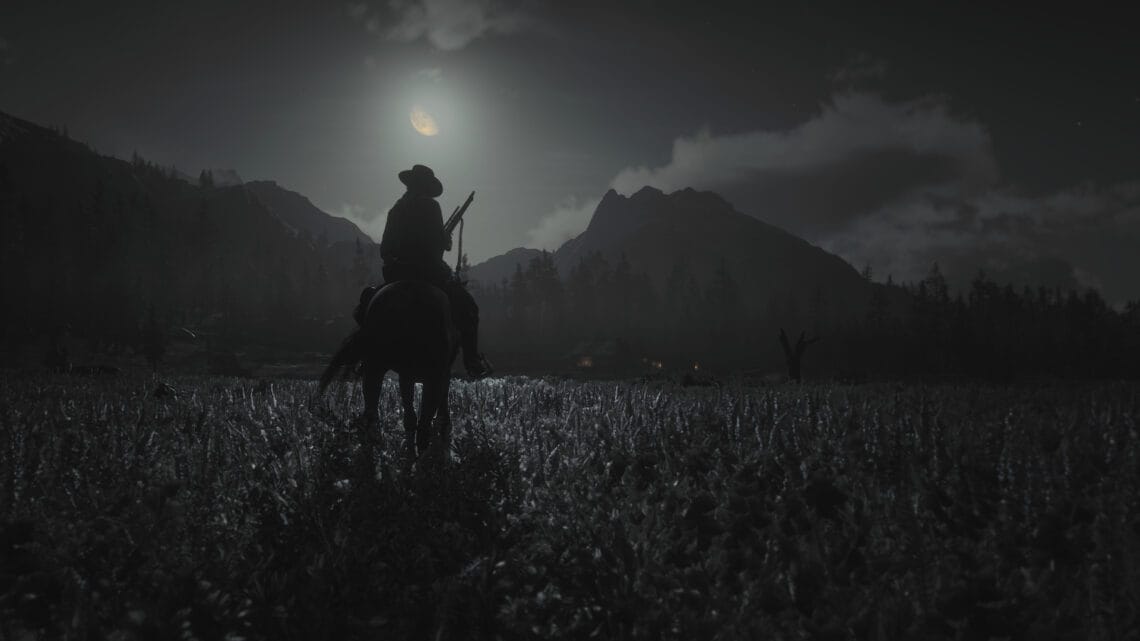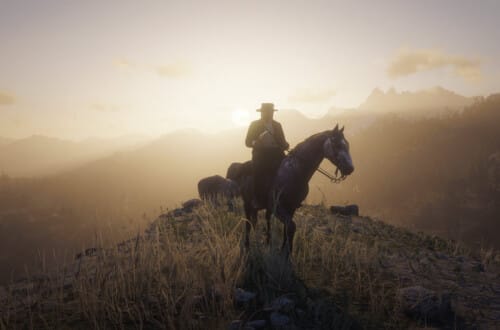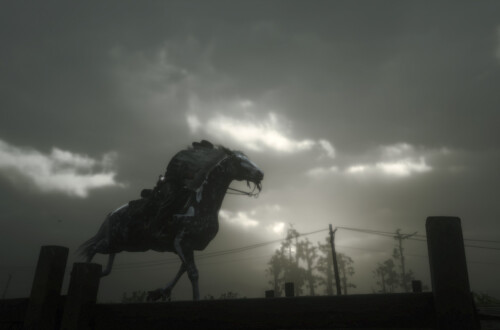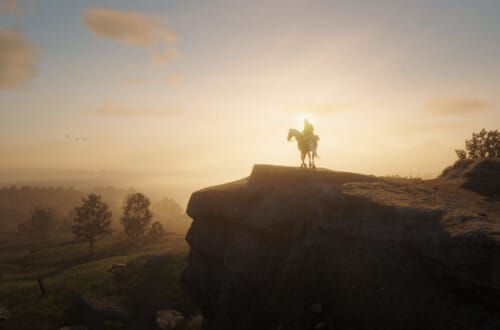The last of the great literary influences on RDR2 shaped Arthur Morgan’s low-honor side.
All articles on this site feature detailed discussion of literary allusions in Red Dead Redemption 2, and as such contain unmarked major and minor spoilers for the game, and occasionally the eventual fates of some characters in Red Dead Redemption. Read at your own risk.
Warlock — an 1958 Western by American novelist Oakley Hall — influenced Red Dead Redemption 2 deeply. Its complex plot is loosely based on iconic elements of the incidents now known as the Gunfight at the O.K. Corral and the Johnson County War. Like RDR2 itself, it reimagines and reworks its source material. Tombstone, Arizona, becomes Warlock, a frontier town plagued by random acts of violence: a group of men associated with local rancher Abe McQuown shoot the place up, rustle cattle, and rob stagecoaches. Because the state governor, General Peach, is senile, he hasn’t issued Warlock a town patent, which means the townspeople have no authority to hire a sheriff. After McQuown’s men scare off — or kill — a series of deputy sheriffs, the town’s self-appointed Citizens’ Committee hires Clay Blaisedell (loosely based on Wyatt Earp) to keep the peace. Blaisedell is a deadly gunfighter — albeit an even-tempered and principled one. Nonetheless, his presence in Warlock ends up being more problematic than the Committee was prepared for. Warlock is a novel that explores problems and doesn’t offer facile solutions; that’s probably why this brilliant work isn’t more popular.
One complication Blaisedell brings with him is his friend, Tom Morgan. RDR2 often repeats names that are allusions (such as “Annabelle”) to underscore them. The name “Tom” haunts the game: Thomas Downes, Tommy, Thomas the boatman, and Tom Dickens all have pivotal, if minor, roles in the story and appear at vital junctures in the narrative. The appellation is attached to a host of minor characters and locations: Old Tom’s Blind, the O’Driscoll whom Sadie Adler most blames for the attack on her and her husband, Francis Sinclair’s father, Sheriff Thomas, a man on the train in “Pouring Forth Oil IV.” “Tom” is easily the most-repeated name in the game, highlighting the importance of the text it points to.
Tom Morgan is loosely based on Wyatt Earp’s friend Doc Holliday, who, like Arthur, died of tuberculosis. (Holliday was 36 when he passed; Arthur is around the same age when he dies.) Tom is the only person who really knows Blaisedell: already a legendary gunslinger, Clay finds himself in danger of being entombed alive within his own myth. In the same way, Blaisedell is the only person who really knows Tom. Just as people fail to see Blaisedell’s human realities, they’ve begun to view Morgan as almost comically evil, a mustache-twirling villain. Naturally, both men are more nuanced than their public images recognize. What unites these apparently disparate people is their courage. While the people around them are frequently uncertain or fearful, these men know what needs to be done, and they have the willpower to do it.

With Percival and John Sontag, Tom Morgan is one of the most important influences on Arthur Morgan’s character. Both men are misanthropic, rather nasty, quick to alienate others. Acts of violence sit easy on their shoulders. Clay tells John Gannon, “I knew a man once who said it was all foolishness—that if you want to kill a man, why, kill him. Shoot him down from behind in the dark if you want to kill him. But don’t make a game with rules out of it” (344). He’s talking about Tom; he’s indirectly telling Gannon that Morgan was the one who killed Abe McQuown in just this manner. In “The Noblest of Men and a Woman IV,” when Jim “Boy” Calloway bewails shooting Slim Grant in the back, Arthur says, “Now calm down. Who cares?! You should have shot him 20 years ago; he’s dead now.” Backshooting is a question of honor to most men in Warlock and to Calloway; Tom and Arthur don’t care. They’re deeply cynical, but not quite nihilistic: both men have deeply-held beliefs, and a friend who’s almost their idol. Ultimately, despite their nasty attitudes — not to mention their murders — they each sacrifice themselves for someone who is, in essence, their brother.
However, Tom is particularly apparent in low-honor Arthur: he’s a man who hides all his feelings behind irony, cruelty, and general nastiness. Like Arthur, he loved a woman who left him. Like Mary, she shows up in town. They argue, and Tom says, “‘Come back to me after all?’ He shouldn’t have said it. He saw the revulsion show clearly in her face, and the strain of maintaining the grin that painfully stretched his lips became immense” (88). Tom is always wearing his own features like a mask, and the strain grows ever greater and more painful over the course of the novel, wearing Tom down until he’s fragile as a shell.
Arthur, like Tom, is not a man skilled in handling painful emotions. Pain and shame often emerge from Arthur as anger. Consider his journal entry after cruelly beating Thomas Downes: “The whole thing confused me. Maybe that’s wrong. The whole thing revolted me/my part.” Collecting debts, he says, “mostly revolts me and shames me.” He’s at his ugliest in those missions because he’s angry with himself over what he’s doing.
Nor can Arthur confront the pain of loss. When Davey Callander is dying, he can’t even say it: he tells Dutch Van der Linde he’s found somewhere for the gang to rest “while Davey … you know” (“Outlaws from the West”). He’s able to write about his pain after Sean MacGuire’s death: “I loved that little loud mouthed wretch more than I knew — he was like an annoying little brother to me.” But after Lenny Summers and Hosea Matthews die, all he can bear to write is “Hosea got himself killed, Lenny got shot in the head.” Someone reading the journal without having played the game might conclude that he loved Hosea and Lenny less than Sean, but we know from the tender way he speaks to and writes about both men that this isn’t so. When Arthur has to tell Abigail Roberts that John Marston is gone, he stammers for long seconds, unable to get the words out.
Where Arthur and Tom differ is that Arthur’s painful emotions do emerge, even if they usually emerge as anger. In “A Strange Kindness,” he attempts to brusquely move on the frightened family hiding under the wagon. Charles Smith, surprised, chastises him: “Come on, Arthur. That’s not how you are,” he says. The game bears this out: Arthur is frequently and instinctively kind to people in need. He’s gentle and courteous to Sadie, Meredith Buckley, Hamish Sinclair, and Sister Calderon; a savior to Captain Monroe, J. John Weathers, Charlotte Balfour, Mrs. Londonderry, and the people enslaved at the shop in Saint Denis. The behavior that Charles finds, well, strange in “A Strange Kindness” is best understood on replaying the game, provided the player has made the right choices — the most honorable choices — to reveal the pain threaded through Arthur’s heart like barbed wire. He confesses to Rains Fall that years ago, his son Isaac and Isaac’s mother were murdered by thieves when Arthur was away. It’s the mother and son, terrified and vulnerable, who hit Arthur where he’s tender. It hurts to look at them; he just wants them gone.




Arthur only directly mentions Isaac twice: to Rains Fall and Sister Calderon, people he intuitively trusts, but knows he won’t see often. Even in his journal, he alludes to Isaac only obliquely: of Jack Marston, he says, “in him, I see what I missed.”
The crux of the difference between high-honor Arthur and low-honor Arthur is primarily his ability to feel, and to express his feelings. High-honor Arthur wearily forestalls Tilly Jackson, Sadie, and Abigail when they try to say goodbye to him, too exhausted to deal with their sadness or his own. Low-honor Arthur brusquely cuts them off altogether. Although Arthur does evil things no matter his honor level, low-honor Arthur is not so much more truly evil than high-honor Arthur as he is more callous and nasty to the people around him. In this, he’s more like Tom Morgan, who is more of a misanthrope than high-honor Arthur is. Low-honor Arthur is still horrified when Dutch refuses to get Abigail. He still goes to get her himself. He still hates Micah Bell. He just refuses to be soft. He’s a stereotypical movie cowboy, choking on toxic masculinity.
Tom Morgan’s inability to express, to even really feel, his emotions is his fatal flaw. Life requires us to deal honestly with its pains in order to grow strong enough to bear them. Tom can’t do it. He hides behind irony and false laughter even as his body rebels: “He felt pleased, watching the fright in the drummer’s face, but his stomach contracted almost in a cramp” (373). Later, “He put his hands to his face; his mouth felt stretched like a knife wound. A burst of laughter caught and froze in his bowels like a cramp” (402). Tom is cramped, frozen, divorced from himself.
Tom hates what public perception is doing to Clay: “You used to be yourself, Clay Blaisedell, he thought bitterly, staring out at the moonlight pale as milk in Warlock. Now they have talked you into being Clay Blaisedell instead” (292). A name, a legend, not a person. When Blaisedell’s reputation is damaged, Morgan finds he cares about it after all: he wants Clay to be seen and remembered truly, neither better nor worse than he really is. Tom knows that Clay’s reputation suffers because of their friendship, but despite his attempts to get Blaisedell to ban him from town to salvage Clay’s image, Clay won’t give him up. After General Peach badly beats Blaisedell, reducing him in the eyes of the town — no one can live up to the kind of heroic image Warlock has made of him, against his will — Morgan makes his move: “For after it they could not touch Clay. After it they could make him neither more nor less. Clay would have come the route, and they would have to let him be, for there was no more. And they would remember Tom Morgan” (438). Tom is determined to help Clay get away from being entombed alive in his own legend, just as Arthur helps John escape. And it gives Tom a way out, too.
Tom stalks through Warlock, shouting, laughing his false laugh, shooting at buildings, screaming for Clay to come out and face him. Finally, after another man tries to shoot Tom and Tom shoots him in the arm, Blaisedell appears. Tom outdraws him, never understanding that it’s because Clay would rather let Tom kill him than do what Tom is forcing him to do, what he actually does: kill his friend. Shooting his own friend (his only friend) is a terrible thing; putting down a violent man is Clay’s job. Morgan thinks this will save Clay from what threatens him. As Tom lies dying, “The dust pulled him away, and he sank through it gratefully; still he could laugh, but now he could weep as well” (445). The ability to weep that Tom can only find in death is the cathartic release that he’s long needed. Of course, what he’s doing isn’t really for Clay; Warlock is full of depressed men who think they need to die. Tom cannot find a way out of the deadened self he’s created, and forces Clay to make one for him. (In the low-honor story variant, if Arthur helps John, his death is an ironic inversion of Tom’s: Micah, who’s essentially the opposite of Clay, shoots him.)
It’s Arthur’s damaged ability to feel that causes his death, as well. He allows Herr Strauss to use him to collect debts even though it goes against his conscience. He feels “revolted” by it, but he doesn’t honor or express that feeling. But where Tom’s hardness ultimately masks a fragility born from scorning himself and nearly everyone around him, Arthur’s protects his softness.
We see this softness in Arthur’s double, Albert Mason (A.M.), a gentle, artistic, self-deprecating man who loves the outdoors, a man Arthur could have been in another life. In “Magicians for Sport,” Arthur snarls that if Trelawny talked, he’ll find out what he said. But when Charles and Arthur find Trelawny, though Arthur’s rude to him (as always), he merely asks Trelawny if he told them anything, then helps him tenderly onto a horse. When Abigail asks him to do something with Jack, he scoffs, “Why? Because I’m your preferred nursemaid?” But he’s sweet with Jack, encouraging and gentle. One of the most touching moments in the game is when he warmly acknowledges the flower necklace Jack makes Abigail, instead of telling Jack that men don’t play with flowers or make jewelry. Arthur’s hardness is merely a way to protect the enormous and bruised tenderness beneath.
But with both Tom and Arthur, we see that when this defense mechanism goes too far, it destroys life and soul. At the end of RDR2’s main story, Arthur is just learning to reclaim his selfhood by knowing his emotions and allowing them to guide him. His softness ultimately becomes the source of his strength, leading him to help John, his brother, escape to safety with his family. A lonely, bleak beauty illuminates his final moments. The other versions of his death lack even this, making them all the more brutally hopeless. It’s only through feeling that Arthur can begin to know himself and find his true path.
New essays are published Wednesdays at 1 p.m. E.T./10 a.m. P.T. Follow me on Bluesky, Twitter, or Tumblr for updates.
New here? Visit the Table of Contents to read the essays in order.
Sharing the site is deeply appreciated!
Bibliography
Expand to view sources.
- Hall, Oakley. Warlock. Introduction by Robert Stone. New York Review Books, 1958.
- Houser, Dan, et al. “Red Dead Redemption II.” Rockstar Games, 2018.





